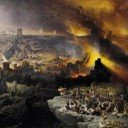As we begin our discussion of the seven bowl judgment of Revelation, we must first note the similarity between the judgments presented in the bowls and their correspondence with the Trumpet Judgments of revelation AND the plagues of Egypt in Exodus.
The former is seen in the possible expanded results of the trumpet judgments end results being seen in the bowl judgments. In other words, though both of the first trumpet and bowls are said to impact the land, the results of the ravaged countryside and food source of the trumpet is seen in the sores and boils in the first bowl. Other similarities between the trumpet and bowls are actually more obvious as we will discover.
The latter point is quite important as Jerusalem is now being seen by God as a new kind of Egypt.
Rev 11:8 and their dead bodies will lie in the street of the great city that symbolically is called Sodom and Egypt, where their Lord was crucified.
This is unmistakeably referring to Jerusalem (where their Lord was crucified) and here the name of Egypt is attached to the city. This is important as we see a promise from God to send the plagues of Egypt against the Israelites if they were to break Covenant with Him (Deut 28). Some more obvious than others.
It should also be noted that quite often what we will find in these bowl judgments are both a symbolic and spiritual application as well as a literal, physical one. These will be discussed as we examine each of the bowl judgments.
THE FIRST BOWL
Rev. 16:2 So the first angel went and poured out his bowl on the earth [land], and harmful and painful sores came upon the people who bore the mark of the beast and worshiped its image.
The first bowl that is poured out is poured out on the “land.” As we have seen previously we have again the representation of the land, which many argue is in reference to Israel. Since we saw the previously the judgments, like those described in the Olivet Discourse, were limited to the land of Judea and limited by the time restraints of both Revelation (soon, near, at hand) and the Olivet Discourse (this generation), there is no reason to argue this plague is expanded beyond the limits of Judea, though they may quite easily impact Roman citizens located there as well.
Also remember that this plague is very similar, if not identical, to a plague of Egypt and that Jerusalem is now seen as a type of Egypt. In fact, the similarity can simply not be missed.
Ex 9:8 And the LORD said to Moses and Aaron, “Take handfuls of soot from the kiln, and let Moses throw them in the air in the sight of Pharaoh. 9It shall become fine dust over all the land of Egypt, and become boils breaking out in sores on man and beast throughout all the land of Egypt.”
This is not only similar to the Egyptian plague, but is promised by the Lord to be set against apostate Israel when they break covenant with the Lord.
Deut 28:27 The LORD will strike you with the boils of Egypt, and with tumors and scabs and itch
A little understanding of the culture of the Old testament is also quite helpful here. Many have heard the term leprosy used. Leprosy was any skin disease and anyone afflicted with it would immediately be outcast and removed from their homes and city. They, in a sense, were excommunicated from the Covenantal family of God. This symbolic representation of Israel being leprous was a greater affliction than even the boils and sores since it meant they were “outcasts” in regards to the covenantal relationship with God.
The rest of the verse from Dueteronomy actually states that these sores cannot be healed! This was a permenant rejection of the Old Covenant relationship and the system it was centered around, most notably, the Temple and the sacrificial system.
In a literal sense it there is fulfillment in that this would be quite a common occurrence in the midst of war and the siege. This is especially true in a situation of a malnutrition and a limited clean water supply. Skin diseases would be quite common in this circumstance, but it should not overshadow the truer and deeper reality of the loss of covenantal relationship with the eternal God.





No comments:
Post a Comment